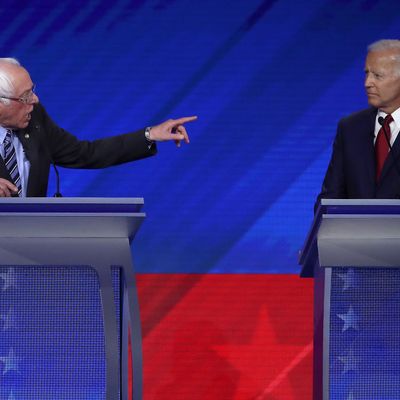
There’s long been a camp of Bernie Sanders supporters and advisers, both formal and informal, who have itched to see a more aggressive candidate on the trail, primarily when it comes to drawing direct contrasts with other candidates. Bernie on the attack, these people believe, is the strongest Bernie.
Sanders himself has often been resistant to this brand of direction, and as he demurred on obvious chances to go straight after rivals in debates and at rallies in recent months, this group has often bristled, impatient for the real contrasts to finally surface. Their level of agitation has only risen as a national narrative recently emerged about Elizabeth Warren’s rise in the race, and about the idea that she is becoming Joe Biden’s primary rival. To many of these Sanders allies — who have never made up his whole team, but who have nonetheless been vocal — his unwillingness to force a made-for-TV moment onstage has been both classic Bernie and frustrating, as the race matures.
On Thursday night, though, Sanders conceded: The time has come to force his issues.
Sanders ultimately spoke less than Biden, Warren, and even Cory Booker, but, at least by the NBC News tracker’s count, he launched the most attacks of anyone onstage, most prominently in his repeat callouts of Biden.
Most of the substance of the contrasts was unsurprising — the entire Medicare for All exchange, for one, followed familiar patterns from previous debates, and indeed much of Sanders’s career — but as the health-care conversation progressed and his signature issue came under sustained fire, he grew heated, at one point waving down the moderators to make sure he could defend the policy from Biden’s attacks. Later, Sanders refused to smile as he took his turn at the mic after Kamala Harris jokingly compared Donald Trump to the Wizard of Oz, and instead performed a hard pivot, taking the former vice-president to task on trade. “There is a reason why in the last 45 years the average American today, despite an explosion of technology and worker productivity, is not making a penny more than he or she made 45 years ago,” he said. “And one of the reasons is that, for decades, we have had disastrous trade policies. I got to say to my good friend Joe Biden, Joe and I strongly disagree on trade.” And when later asked about Afghanistan, Sanders again revealed his clear intention to take Biden on, talking instead about Iraq. “The truth is, the big mistake, the huge mistake, and one of the big differences between you and me: I never believed what Cheney and Bush said about Iraq,” he said.
The strategic imperative to execute this turn now is clear. As Bill Press, the progressive radio host who hosted one of the first Bernie 2016 planning meetings in his home years ago, explained in the spin room after the debate, Sanders’s “challenge is not so much from Joe Biden, it’s from Elizabeth Warren. From the outside it looks like if he was losing ground, it’s in that progressive lane. He had to show people, ‘Look, I’m the real deal here. I was there in 2016, I’m here in 2020, stronger than ever, and don’t think about abandoning me and going with her.’”
A big part of doing that is positioning himself as Biden’s biggest rival, not as simply one of the top three candidates. Sanders hasn’t felt pressure to make that case yet, but now he knows he has no choice but to solidify his own base of support, then try again to expand it.
And it’s clear he believes that means attacking Biden, specifically, not any of his other rivals — at one point he pointed out he was the only person onstage to vote against all of Trump’s military budgets, but that only implicitly hit his fellow senators Warren, Harris, and Amy Klobuchar. He never used their names. “Biden is the front-runner, I think he’s kinda a weak front-runner at this time. But there’s still a number of working-class voters who are supporting Joe Biden,” said Jeff Weaver, a senior Sanders adviser for years, pointing out this was the first time all the top candidates were onstage together, and potentially the last time for a few more months, since October’s debate will likely be split into two stages again. To one former Sanders aide who worked closely with him on debate prep in 2016, the candidate now appeared to be far more comfortable drawing these contrasts than he had early in the last cycle.
But, as always with Sanders, the question is whether the attacks — so classic in their content, and therefore so unlikely to surprise many viewers (who already know both he and Biden well) — will shift the political ground. “Did it change anything?” the former aide asked, genuinely unsure.
Sanders is betting the answer is yes, or that it’s at least a question he must test now, seven months into his run. “These races evolve, and every day we get closer to the time of people voting. We’re still, actually, quite far away from that,” said Weaver. “But it is time.”






























